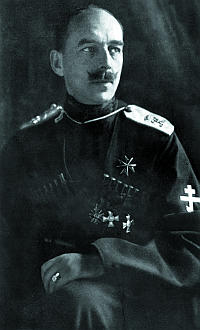Pavel Bermont-Avalov
| Pavel Bermondt-Avalov | |
|---|---|

Pavel Bermondt-Avalov.
|
|
| Born |
4 March 1877 Tiflis, Tiflis Governorate, Russian Empire |
| Died | 27 December 1974 (aged 97) New York City, USA |
| Allegiance |
|
| Service/branch |
Imperial Russian Army White Army |
| Years of service | 1901–1921 |
| Rank | Major General |
| Battles/wars |
Russo-Japanese War First World War Russian Civil War |
| Awards |
Order of St. George Order of Saint Anna |
Pavel Rafalovich Bermon(d)t-Avalov (Avalishvili) (Russian: Павел Рафалович Бермон(д)т-Авалов) (4 March 1877 – 27 January 1974) was an Ussuri Cossack and warlord.
Bermondt-Avalov was born at Tbilisi in Tiflis Governorate, modern Georgia. He adopted his second surname Avalov (Avalishvili) after his adoptive father, Georgian prince Mikhail Avalishvili. He received a musical education joining the Ussuri cossacks in 1906 after serving as a musical conductor in the Transbaikal cossacks. He joined a regiment of Lancers in 1909 and was promoted to Captain in 1914.
He was appointed to lead the German-established Western Russian army (subsequently frequently known after his name as "the Bermontians") which was meant to go to fight the Bolsheviks in the Russian Civil War, but, believing that communists would be defeated without his help, Pavel Bermondt-Avalov decided to strike against the newly independent nations of Lithuania and Latvia instead. His "Special Russians Corps" supposedly numbered about 50,000 men. He was one of the few anti-communist generals who openly propagandized monarchist ideals.
Bermondt-Avalov was promoted Major General in 1918. He took over the White Forces in the Baltic from Prince Anatoly Lieven, who commanded a contingent in the Baltische Landwehr. In 1919, his forces joined those of Major General Rüdiger von der Goltz to form the so-called "West Russian Volunteer Army" which attempted to proclaim the "Western Central Government" in Riga. German Free Corps were operating in the Baltic States since spring 1919 to keep away the Red Army. In summer 1919 the Entente States and the German government ordered the troops back, but the soldiers refused. Until beginning of October most of the 40,000 German volunteers entered the Bermondt-Army consisting of about 10,000 Russians, mostly former prisoners of war released from German camps. With this masquerade the Germans tried to keep their engagement in the Baltics and to secure German interests in the area. They used Bermondt for their own purposes. Since the German government stopped paying for the troops, finances were coming mostly from German economic leaders that had interests in the Baltics. At the end the Army printed its own money.
...
Wikipedia
